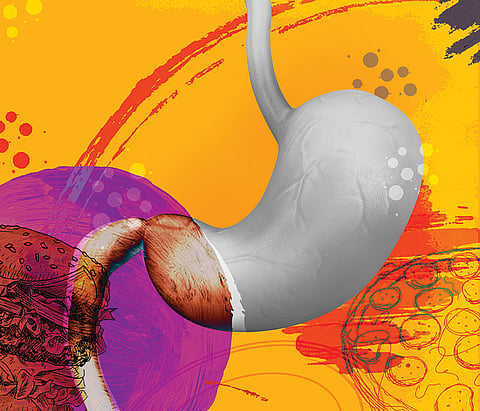Seven Sins: Gluttony is a mostly biochemical phenomenon, says Nathan H Lents
Down To Earth (DTE) speaks to scientists and authors to take stock of what we know so far about the emotions of pride, greed, lust, envy, gluttony, wrath and sloth; the historical debates around them and the critical gaps in our understanding.
In the eleventh part, DTE speaks to Nathan H Lents, a professor of biology at John Jay College of Criminal Justice, US. Lents works on the evolution of the genome to understand what makes humans unique, and has authored two books.
Q. Did gluttony help in the evolutionary success of humans?
A. Yes. I think we have more than enough evidence to conclude that gluttony is innate in humans. Firstly, we see a voracious appetite in many other animals. It is not a uniquely human problem. Since access to calories is often a limiting factor for survival, many animals have a constant drive to seek and consume food, and most animals have an appetite for the most calorie-dense foods they can access. We have to manage the calorie intake of animals that we care for in our homes, farms and zoos. If we provide unlimited access to preferred foods, many of them will become obese. Secondly, our metabolisms are engineered to zealously store any excess calories as fat and resist attempts to lose weight. This comes from our history of feast-or-famine lifestyle.
Q. Are gluttony and greed linked? Are greedy people typically gluttons?
A. No. I do not see greed and gluttony as biologically linked. Greed is tied to the acquisition of material resources for the purpose of power and social dominance. Greed is a psychosocial phenomenon, whereas gluttony is, mostly, a biochemical one.
Q. The idea that low physical activity is chiefly responsible for the obesity epidemic has fallen out of favour. Why?
A. Because studies have shown that, one, physical activity alone is ineffective as a means of losing weight, and, two, the degree of physical activity alone is a poor indicator of body mass index (or BMI, a measure of body fat based on one’s height and weight) or obesity. In both cases, the diet is a better predictor. For many, it is easier to lose weight through dietary changes alone, at least at first. And BMI is much better predicted by your diet than by your level of physical activity.
Q. Is gluttony behind the increased rates of obesity? What about genetic predisposition and the studies linking loneliness with binge eating?
A. Gluttony plays a role because humans have a powerful appetite for calorie-dense foods. The way that behavioural drives work is through brain chemistry. Any time we satisfy a drive, we get a boost of dopamine in our reward centre, which reinforces the behaviour and trains us to keep seeking it. Addiction works the same way, but even simple things, like a cold glass of water on a hot day, can tickle our reward centre.
Going further, individuals who are starving for dopamine because of loneliness, under stimulation, can experience a stronger desire for the things that give them some psychological relief. This is why most psychologists agree that chronic overeating is often associated with underlying psychological issues that should be explored in counselling.
Q. Do you think the term gluttony is falling out of favour in recent times?
A. I agree that you do not see the word gluttony as much as you used to. In historically Christian countries, this may be due to the association of gluttony with sin. In the Catholic tradition, gluttony is one of the seven deadly sins. Talking about sin has fallen out of fashion in modern society since the role of religion has been reduced. Moreover, we now understand overeating and obesity as issues that are much more complex than a simple matter of will power. These are metabolic issues more than they are free choices.
Q. Are there any positives to gluttony?
A. We all enjoy nice food and drink, but gluttony and overindulgence are major health problems, not just for us as individuals but for society. The way we eat and produce food is not even close to being sustainable. The land and resources needed to produce rich meats and animal products is far more than what is required for healthier foods. That is yet another reason to make healthy food choices of fresh fruits and vegetables.
Q. What are the gaps in our understanding of gluttony?
A. We understand why humans are driven to consume calorie-rich foods, but we are still figuring out what the “optimal diet” for humans is. That is one of the biggest challenges in health and wellness.
(as told to Rohini Krishnamurthy)
This is the twelfth of an 18-part series.
This was first published as part of the cover story of the 16-31 May, 2024 Print edition of Down To Earth

